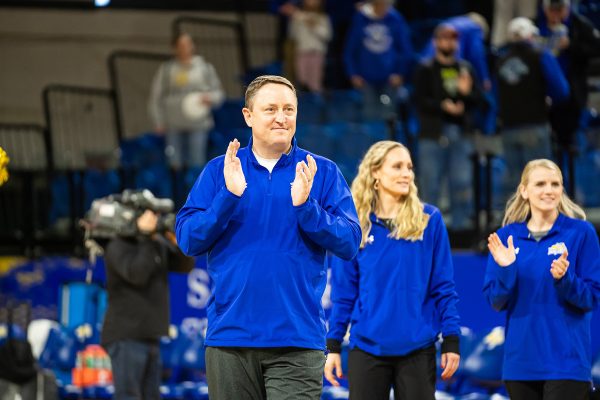Sports are a unifying force
September 26, 2006
Brian Kimmes
This past week, Monday Night Football viewers witnessed a historic moment-the New Orleans Saints’ homecoming at the Superdome. On Monday, Sept. 25., the NFL returned to New Orleans for the first time since the 2004-2005 season.
Fourteen months after Hurricane Katrina devastated the city, much of the destruction remains. The Superdome, like many other buildings in New Orleans, suffered severe flood damage, which forced the Saints to play elsewhere last season.
Almost half of the population of New Orleans still has not returned to the city after Katrina. But the football team has returned, and the citizens of New Orleans are thrilled. It was estimated that almost a quarter of the city’s population would attend Monday night’s game.
Why the big deal for a football team? I have already discussed America’s obsession with football, so I will not do it again. However, the outpouring of love for the Saints’ return goes beyond the regular obsession for a football team. It strikes at the heart of why we love sports, why we needed sports after 9-11 and why we will continue to need sports.
Sports are loved for a variety of reasons, from the insignificant to the important. First, sports are entertainment. They provide enjoyment for people and are similar to movies or television shows in that respect. People receive pleasure from viewing them.
Most people enjoy watching teams they are somehow connected to, which is the second reason sports are so loved – people become connected to them. Fans develop connections to teams and players. Even though most fans will never get a chance to meet a player from their favorite team, they feel a connection to that organization.
That connection comes in a variety of ways. For many people, the connection comes with the people they watch the game with. Some kids can only relate to their parents through sports. A father and son might not see eye-to-eye on various issues, but when their favorite baseball team is playing, all the issues between them fade. The father and son are connected through sports and to sports.
Another example is a grandfather who never misses a ball game. When his grandchildren think of Grandpa, they automatically think of Grandpa’s favorite team. Oftentimes, the grandchildren will sit and watch the game with Grandpa. Watching sports becomes their memory of him.
Sports can bring friends and family together. Some of my fondest memories as a kid were when my family would build a fire in late fall and watch the World Series on television. It was obviously better when the Twins were part of the Series, but we would watch it no matter who played. All five of us would pick the team we wanted to win. My mother would always pick the underdog. My older brother and I would constantly make fun of her for picking what we thought was the losing team, even though her team won a fair amount.
Sports lend themselves to everybody’s favorite story-the underdog story. With the exception of a few teams, fans do not like the team that wins all the time. The greatest moments in sports are often the greatest upsets. The 1980 “Miracle on Ice” proves that beyond a doubt. The United States’ defeat of the Soviets is the greatest moment in sports history. It is also the greatest upset in sports history.
Almost all sports movies follow the underdog storyline. Either a team or an individual has a million-to-one shot of winning, yet they always seem to pull it out in the end. Everybody knows the underdog will win, yet everybody still loves it.
On top of being the greatest underdog story of all time, the “Miracle on Ice” served as a rallying point for the United States. As an American, you were proud that the hockey team beat those commie bastards. For a sports enthusiast, the question “Where were you when it happened?” refers to the Lake Placid miracle, not the JFK assassination.
Fans rally around a sports team because it allows them to feel like they are a part of something bigger. Two strangers can jump up and hug each other at a football game when their team scores a touchdown. Two big, hairy, homophobic men normally do not hug each other, but when it is fourth and 10 and the quarterback scrambles for a first down, anything goes.
Sports allow people to feel connected to something they otherwise cannot feel. Most people live ordinary, boring, routine-filled lives. Sports break up that monotony. They provide entertainment. They bring people together. They connect us to people. They allow us to feel a part of something larger than the sum of its parts.
#1.883398:2207854054.jpg:ball_talk.jpg:Brian Kimmes, Ball Talk:
























